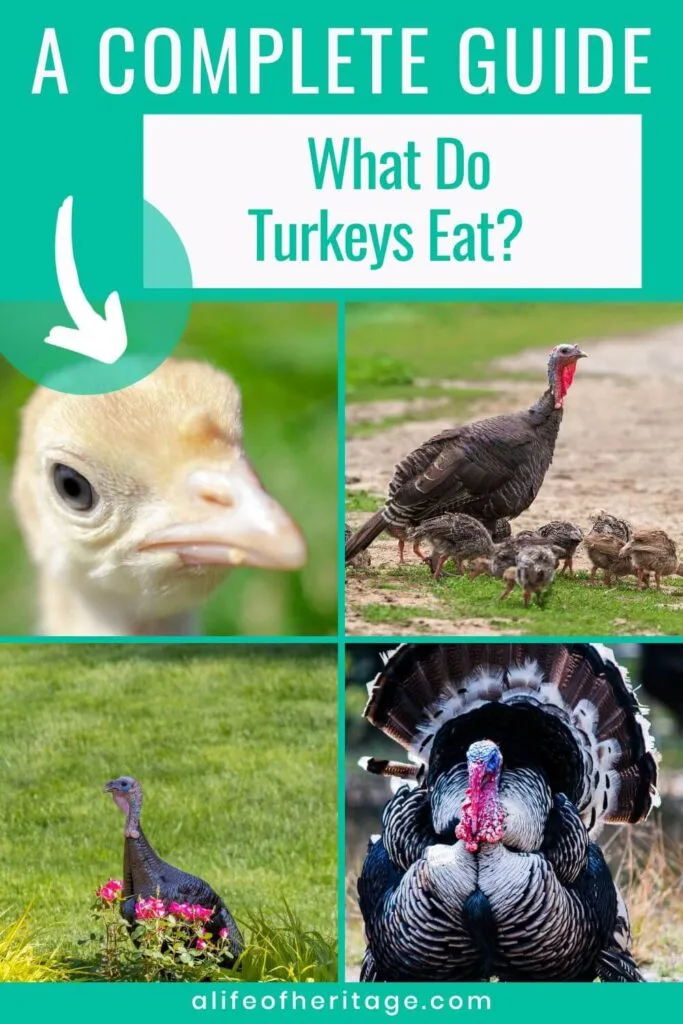Turkeys are fascinating birds that have long held a special place in human culture and cuisine. Whether you’re interested in raising them on a farm or just curious about their dietary habits, understanding what turkeys eat is crucial for their well-being and for those who appreciate them on the dinner table. In this article, we will explore the dietary preferences and nutritional needs of turkeys.
A Diverse Turkey Diet
Turkeys are omnivores, which means they have a diverse diet that includes both plant and animal matter. Their diet varies depending on their age and the environment in which they live. Let’s break down what turkeys eat:
Young Turkey Poults (Chicks):
When turkeys are chicks, they primarily consume high-protein feeds specifically formulated for their nutritional needs. These feeds typically contain 24-28% protein to support their rapid growth and development. As they grow, turkey poults may also peck at small insects, worms, and seeds.
Read more about turkey poults here. And learn how to raise turkeys from hatching to adult here.
Adult Turkeys:
Once they reach adulthood, turkeys continue to consume a variety of foods. Their diet mainly consists of:
-
- Seeds and Grains: Turkeys forage for seeds such as grass seeds, wheat, corn, and barley. In the wild, they scratch the ground to uncover these food sources.
- Insects and Invertebrates: Insects like grasshoppers, ants, and beetles are a significant part of a turkey’s diet. They also eat earthworms, snails, and spiders.
- Berries and Fruits: Turkeys enjoy a wide range of fruits and berries, including strawberries, blueberries, and acorns.
- Vegetation: They consume various types of vegetation, including leaves, shoots, and small plants. Turkeys have been known to eat clover, dandelions, and other greens.
- Nuts: Nuts like acorns and hickory nuts are a fall favorite for turkeys. These provide essential fats and energy, especially before winter.
Learn more about raising turkeys here. Find out if turkeys lay eggs here. Learn how to useturkey feathers in fancy projects. And read about the different turkey breeds you can choose from.
Commercial Turkey Feeds:
For those raised on farms, commercial turkey feeds are a significant part of their diet. These feeds are carefully formulated to meet their nutritional requirements, containing a balanced mix of grains, protein, vitamins, and minerals.
Water:
Just like any living creature, turkeys need access to clean, fresh water at all times. Water is essential for digestion, temperature regulation, and overall health.
Seasonal Changes:
Turkeys adapt their diet to the changing seasons. In the spring and summer, their diet is rich in insects, fresh vegetation, and berries. As the weather cools and fall approaches, they shift towards consuming more nuts and grains to fatten up for the winter. During the winter months, their diet can become more reliant on stored food sources like grains and seeds.
The Conclusion on What Do Turkeys Eat:
Turkeys are versatile eaters, capable of consuming a wide range of foods depending on their age and the time of year. This adaptability has allowed them to thrive in various environments, from woodlands to farmlands. Whether you’re a turkey enthusiast, a farmer, or simply someone interested in learning about these remarkable birds, understanding what turkeys eat is essential for their well-being and conservation.
If you’re considering raising turkeys on your farm, consult with a poultry expert or veterinarian to ensure that their dietary needs are met to promote healthy growth and development. For those who appreciate turkeys on their plate, it’s worth noting that their diverse diet contributes to their flavorful meat, making them a staple of many delicious dishes enjoyed by people around the world.
